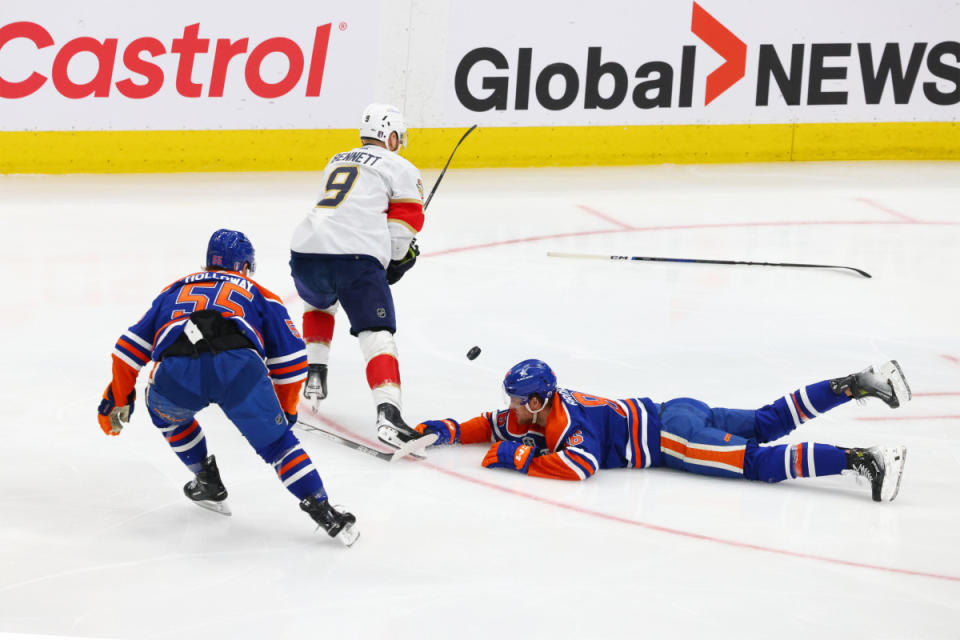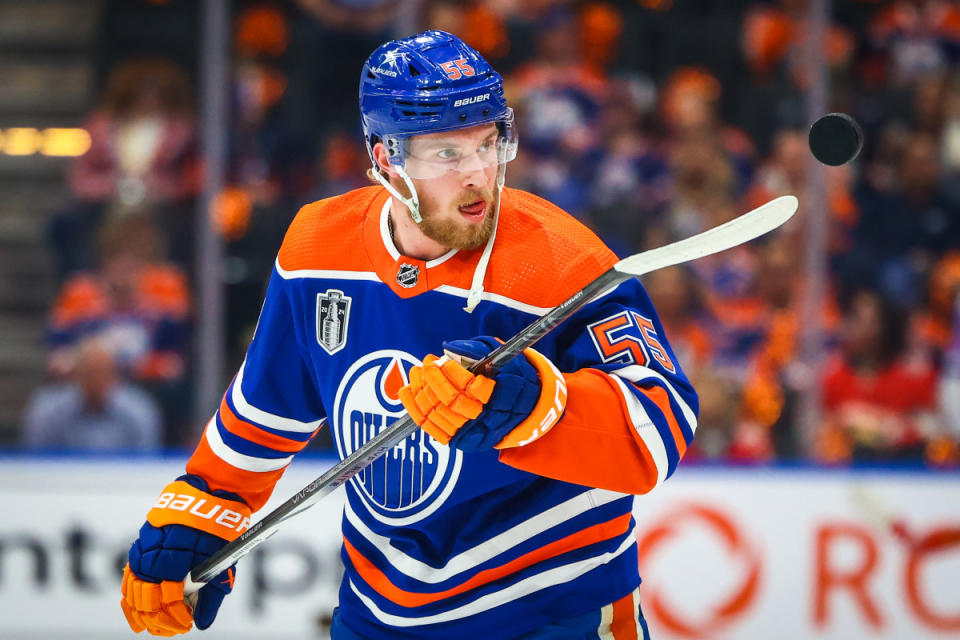Doug Armstrong: 'Quite honestly, I'd do it to my mother if she was managing the Oilers'
ST. LOUIS -- Call Doug Armstrong a savage. Heck, call him whatever you want.
But the bottom line is this: business is business, and the St. Louis Blues' general manager would put his own mother in a bind to make his team better.
That's the end result after the Blues raised eyebrows around the NHL when Armstrong and the Blues tendered not one but two offer sheets to the Edmonton Oilers for defenseman Philip Broberg and forward Dylan Holloway.
When Tuesday's deadline for matching came to light, the Oilers decided to pass, and the Blues got the targets they set out to get, and Armstrong wanted to make clear that nobody is safe, internal family included, from business.
"I think it was reported that I wouldn't have done this to Kenny Holland," Armstrong said of longtime friend and former Oilers/Detroit Red Wings GM, whose contract was not renewed after the Stanley Cup Final and former Chicago Blackhawks GM Stan Bowman was hired. "That's the furthest thing from the truth. Quite honestly, I'd do it to my mother if she was managing the Oilers.
"My job is to take care of the St. Louis Blues fans and the St. Louis Blues organization. We saw an opportunity to do that."
And there you have it.
Armstrong saw an opportunity to make his club better, stronger, and quite frankly, younger.
View the original article to see embedded media.
Broberg, 23, and Holloway, who turns 23 next month, fall in line with the Blues wanting to acquire players that fit into the 20s age range and are under control.
Each is a first-round pick (Broberg eighth overall in 2019, Holloway 14th in 2020). Broberg signed a two-year, $9.16 million ($4.58 million average annual value) and Holloway signed a two-year, $4.58 million (2.29 million AAV) contract.
"These are two young players we’ve obviously watched when they were in their draft year and watched them develop," Armstrong said. "They’ve been on a very competitive team over the last couple of years and shuffled between American (Hockey) League and NHL as Edmonton worked its salary cap. We saw really good growth from them in the American League and what they did last year in the playoffs. It seemed to be consistent with where they were drafted and it looked like an opportunity for us to stay consistent with our message of trying to add as many players as we can in a certain age bracket. I think right now we have nine from 2020-2024, first-round picks, and 10 from 2019 if you add Philip in there. So, we have a core stable of young players we hope can grow together."
What Armstrong did was conduct business as he saw fit, going after two young players he saw fit to make his team better, and as ruthless and cut throat as it may sound, he did it within his rights in a salary cap era. And so he used two punches instead of one.
"You’re looking at how you can acquire the players and what circumstances set it up best," Armstrong said. "Because Edmonton had a really great July 1st. I thought (Oilers CEO of hockey operations) Jeff [Jackson] did a great job of improving his team, but it put them in a situation where they had used a lot of their cap equity. They had two young players and we felt if we could pinpoint those two players, make them offers that might be difficult for Edmonton to match, we’d go that direction. It’s obviously harder to match two than one, so we went that direction."

And knowing the Oilers have star-studded players they have to re-sign (Leon Draisaitl, Connor McDavid and Evan Bouchard) within the next couple years, the Blues tightened the screws with a second year on the offer sheets.
"Yeah, it certainly played into it," Armstrong said. "You go into it thinking is one year more difficult, because then players have arbitration rights if they have good years? One year less because they don’t have great years, they can get taken back in the CBA and we just felt a two-year offer would be good for the Blues. It lets these guys know where they’re going to be and they can put roots down here.
"Edmonton has so many good players, they have decisions to make signing those players."
Did Armstrong have to overpay each to get the job done? Yeah. Did he have to give up some draft capital to get it done? Yeah. Did he have to offer up more draft capital to get it done? There was a sweetener in the deal. But did he have to give up higher draft capital to get it done? No.
"Maybe overpaying, if you want to say that, for these guys wasn’t difficult for us because we have the cap space," Armstrong said. "When their contracts are done, the cap should be approximately 100 million potentially. If it is at 100 million, these guys are 2.4 percent and 4.5 percent. We think it’s a good investment for us, a good investment for the Blues. We think highly of these players. We think they’re going to be key players on the team.
"There just became a comfort level, dollar-value wise too and assets. We want to keep our first-round picks, we’ve done that now since 2020. We have our first-round pick next year. You just try to maximize the leverage that you have going right up to the maximum of a second-round pick and max of a third-round pick. We didn’t feel comfortable going past that and I didn’t think it was necessary."
The sweetener to make the offer sheets go through, Armstrong and Bowman worked out a minor trade that saw the Blues sent 2023 fifth-round pick in defenseman Paul Fischer and a 2028 third-round pick for future considerations.
"Our goal was to get these players," Armstrong said. "I felt that when we were talking, he said, 'If we worked to a point of that’s agreeable, we won't match.' So our goal was to get the players and to have to add a little bit to the second and the third to reach our goal. We as an organization wanted to do that."
So as much as those around the league want tp criticize Armstrong for doing something that shouldn't be done, don't, because it's a tool well within everyone's reach and usage.
"I’ve read what people are writing. If there is a GM code not to do offer sheets, no one emailed it to me," Armstrong said. "This is a tool that I think everyone uses and should use. ... So, there’s no code. I did talk to some people in the league. ... Offer sheets are there if you think you’re going to get the player.

"I don't believe in offer sheets to harm an organization. Meaning, put an offer sheet on because you know they’re going to match but it puts them in a bad spot. That for me at least, I wouldn't do that. I don’t see the purpose in that. I think the purpose of an offer sheet is, if you look at a franchise and you think you have opportunity to get a player, you do it and that’s the way we looked at this one."
And for the conspiracy theorists that believe an eye for an eye and Edmonton should target someone from the Blues moving forward, sure, they have that right, but for the Oilers and anyone else that would think that way ...
"I know moving forward, I’ll speak for the St. Louis Blues, when we have good young free agents, we’re going to leave enough cap space there to sign those guys," Armstrong said. "It’s a double-edged sword for a player, also. You can hold out to get an offer sheet and if you get it, you’re the winner. You win if the team doesn’t have the space. But there also becomes the point for a manger and say, 'I’ve had enough of this, you're going to come back on a two- or three-year deal and that's exactly what I offer you or you can sit the year out.' That's fine too. Everyone has to play ball to get these deals done. I’m looking forward to working with our group to leaving enough space to sign our own players. If push comes to shove and it gets pushed, we’ll react and they’ll react. That’s the nature of business for all 32 teams to deal like that.
"I want to reiterate that this wasn’t anything against an organization. This was an attempt for us to get better and that’s the only reason we did it, and it was successful and we’d do it again if we think it’d be successful. That code I’ve been hearing about, it’s not true. Managers do what they have to do for their franchises. If not, they shouldn’t be doing the job. If you have two players, and I'll say 'Twister' and 'Chaser.' They played together and then they played on different teams. They fought, they're great friends, they're best friends. Everyone has a job to do; you have to do your job. That’s how we got to this point. I had to do my job."
Related: Philip Broberg looking forward to new challenge with St. Louis Blues


 Yahoo Sports
Yahoo Sports 
